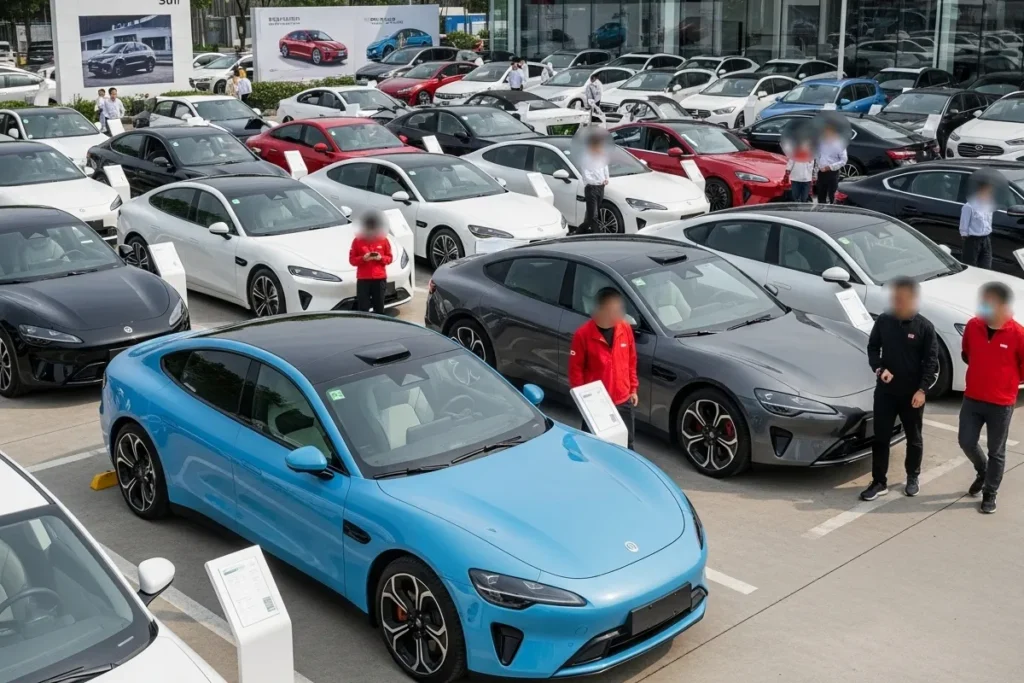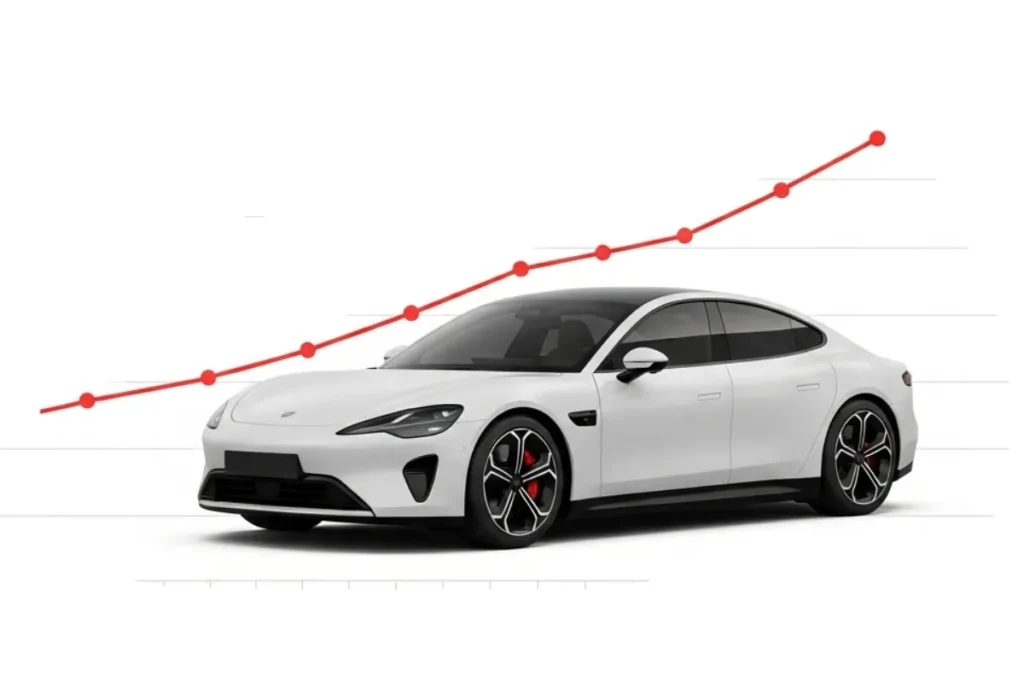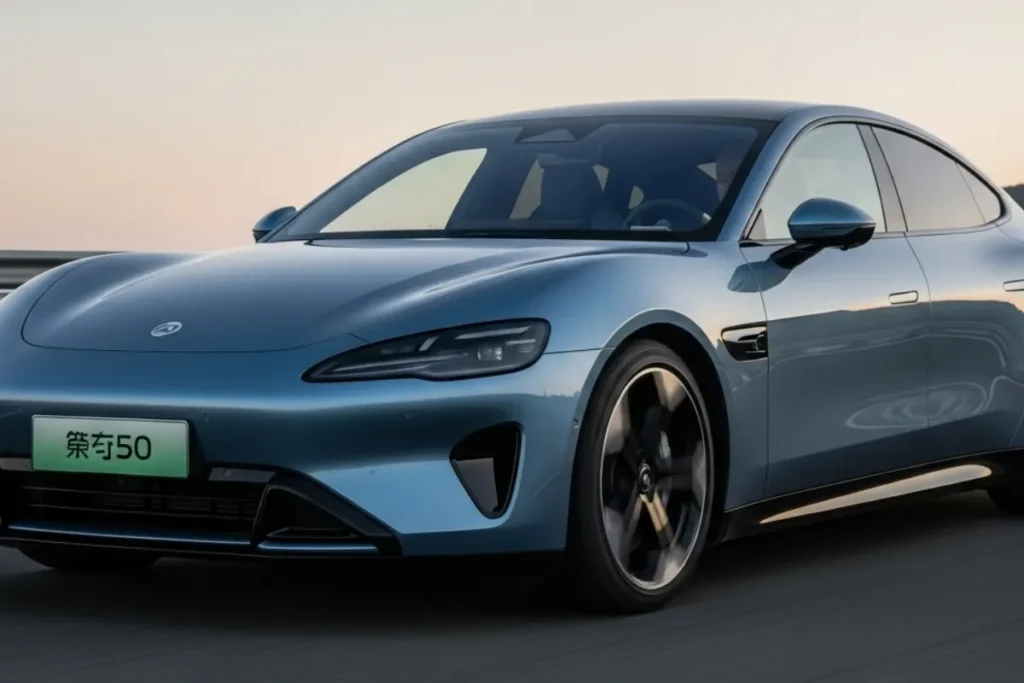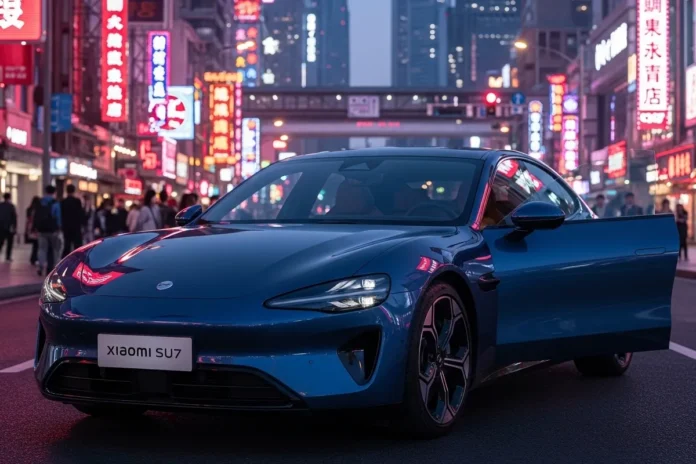Discover the Xiaomi SU7 electric sedan, launched in 2024, and its significant impact on the Chinese electric vehicle market. With impressive design and advanced technology, the SU7 boasts a high resale value, retaining approximately 88.1% after one year of ownership. Explore the features that make it a leading choice among buyers, along with insights into the evolving EV market in China. Learn how the Xiaomi SU7 integrates with the broader Xiaomi ecosystem and what consumers should consider when purchasing this innovative electric vehicle, ensuring a solid investment for the future.
Introduction to the Xiaomi SU7
The Xiaomi SU7 electric sedan was launched in 2024, positioning itself as a significant contender within the burgeoning electric vehicle (EV) market in China. As one of the latest entries from the tech giant Xiaomi, the SU7 has successfully captured the attention of car enthusiasts and environmental advocates alike. This model reflects Xiaomi’s commitment to innovation and state-of-the-art technology, promising a blend of efficiency, performance, and affordability.
Upon its debut, the initial market reception of the Xiaomi SU7 was overwhelmingly positive, owing to its appealing design and impressive specifications. Equipped with cutting-edge features, including advanced driver-assistance systems, a high-capacity battery that ensures an extended driving range, and a sleek interior that prioritizes comfort and convenience, the SU7 stands out amongst its competitors. The electric sedan offers a compelling alternative to traditional combustion engine vehicles, aligning with the increasing consumer demand for sustainable transportation solutions.
Moreover, the Xiaomi SU7 integrates seamlessly with the wider ecosystem of Xiaomi products, allowing for enhanced connectivity and user experience. Such functionality has bolstered its appeal among tech-savvy buyers, contributing to its significant market presence. In the context of the rapidly expanding EV used car market in China, the Xiaomi SU7 is not just a car; it represents an intersection of technology and motoring, offering potential buyers not only utility but also a lifestyle choice.
As the market continues to evolve, understanding the factors that contribute to the Xiaomi SU7’s value retention will be crucial for prospective buyers and investors alike. Its introduction has also sparked discussions around the depreciation rates of Chinese electric cars and their standing in various resale reports, such as the CADA EV resale report. The implications of these factors will be essential to exploring the overall impact of the Xiaomi SU7 within both new and used car markets.
Delivery Milestone and Market Impact
The Xiaomi SU7 electric sedan has achieved a remarkable milestone, surpassing 200,000 deliveries in China since its launch. This achievement is indicative of strong consumer confidence in both the vehicle and the brand, underscoring the Xiaomi reputation for quality and innovation in the electric vehicle market. As one of the leading players among Chinese electric cars, the SU7’s delivery figures are directly correlated with the growing acceptance and demand for EVs in China.
High delivery numbers not only reflect robust consumer interest but also significantly influence the resale value of the Xiaomi SU7. Generally, a high volume of sales suggests that the vehicle is well-received, which can enhance its desirability in the used car market. Consequently, vehicles like the SU7 are likely to retain their value more effectively compared to competitors. According to the latest reports, including the cada ev resale report, vehicles with substantial delivery milestones tend to experience less depreciation over the first year. The Xiaomi SU7 is expected to showcase a strong one-year value retention, which enhances its attractiveness as a second-hand purchase.
Additionally, the implications for the broader EV used car market in China are significant. As more consumers enter the market seeking reliable and valued second-hand electric vehicles, the SU7 stands out due to its established reputation and performance metrics. Its consistency in sales reinforces its competitiveness against other electric vehicles, ensuring that it remains a preferred choice for prospective buyers. The ability of the Xiaomi SU7 to maintain a desirable resale position amidst a competitive landscape is essential, particularly as the Chinese EV market continues to evolve and expand.

Understanding Resale Value: What It Means
Resale value is a critical concept in the automotive industry, particularly for consumers considering the purchase of a vehicle, such as the Xiaomi SU7 electric sedan. It refers to the amount a car is worth when it is resold, reflective of its market demand, overall condition, and depreciation incurred over time. For electric vehicles, including the Xiaomi SU7, resale value carries specific importance as it influences the overall cost of ownership and the financial return upon sale.
Calculating resale value involves various factors, including the vehicle’s initial purchase price, mileage, maintenance history, and its popularity in the second-hand market. The depreciation rate, which varies significantly among different brands and models, plays a crucial role in determining how much value a car retains over the years. For instance, models like the Xiaomi SU7 may exhibit impressive retention rates, as shown in studies like the CADA EV resale report, which highlights the growing demand for Chinese electric vehicles in the resale market.
Several factors influence the resale value of a vehicle, such as market trends, changes in technology, and governmental incentives for electric vehicle ownership. As electric vehicles gain traction, understanding the nuances of the EV used car market in China is essential for prospective buyers. A model that holds its value well, like the Xiaomi SU7, can offer significant savings in the long run, making it an appealing option for consumers.
The importance of value retention over time cannot be understated, as it directly impacts the investment made into a vehicle, particularly for electric cars. Higher retention values mean that the total cost of ownership decreases, providing more financial flexibility to owners when they decide to sell or trade in their vehicles. This aspect supports the growing interest in models such as the Xiaomi SU7, emphasizing the significance of choosing a vehicle with a strong resale value in the current automotive market.
Resale Value of the Xiaomi SU7: Statistics and Analysis
The Xiaomi SU7 electric sedan has generated significant attention in the Chinese automotive market, particularly for its remarkable resale value retention. According to the latest data from the China Automobile Dealers Association (CADA), the SU7 boasts an impressive value retention rate of 88.1% after just one year of ownership. This figure positions the Xiaomi SU7 favorably when compared to its contemporaries in the rapidly evolving electric vehicle (EV) market.
To contextualize this statistic, it is essential to examine the depreciation trends prevalent among other popular Chinese electric cars. In general, the depreciation rates for electric vehicles tend to be steeper in the first year due to factors such as rapid technological advancements and the influx of newer models. For comparison, numerous competitors in the EV segment typically see first-year depreciation rates ranging from 15% to 25%. The Xiaomi SU7’s 88.1% value retention sharply contrasts this trend and highlights its robust position in the market.
The strength of the Xiaomi SU7’s resale value can be attributed to several factors. First, the brand’s growing reputation and consumer trust contribute to a strong demand for its vehicles in the second-hand market. Additionally, advancements in battery technology and performance enhancements provide reassurance to prospective buyers about long-term viability and resale value. This is critical within the electric vehicle landscape, where lingering concerns about battery degradation can influence purchasing decisions.
In the context of the overall EV used car market in China, the Xiaomi SU7 stands out as a prime example of successful value retention. The CADA EV resale report indicates that consumers are increasingly looking for options that offer desirable features as well as strong resale potential. By maintaining a high retention rate, the Xiaomi SU7 not only reinforces its market presence but also enhances its attractiveness among second-hand buyers looking for reliable and valuable electric vehicles.

Comparative Analysis with Other Best-Selling Chinese EVs
The Xiaomi SU7 has emerged as a promising contender in the rapidly growing Chinese electric vehicle market, especially concerning its resale value. In a recent comparison, the SU7 recorded an impressive one-year value retention of approximately 84.45%, which significantly outperforms its key rivals such as the Aito M9 and Li Mega. While the Aito M9 retains about 79.58% of its value over the same period, the Li Mega exhibits a depreciation rate that leaves it behind in the competitive landscape of electric vehicles.
This performance indicates not only the strength of Xiaomi’s brand but also the effective integration of technology and user experience, elements that resonate strongly with Chinese consumers. The resale potential of the Xiaomi SU7 holds substantial implications for potential buyers, particularly for those concerned about long-term investment in an electric vehicle. By considering the current trends within the EV used car market in China, potential buyers can appreciate how the SU7 stands out amidst an array of options.
A notable aspect contributing to the SU7’s depreciative resilience is its reputation for reliability and innovative features, which are often highlighted in the CADA EV resale report. Contrarily, while other models like the Aito M9 and Li Mega present themselves as robust alternatives, they struggle to command the same market confidence. As buyers weigh their options, understanding these comparative figures will ideally guide them in making informed purchasing decisions, ensuring they opt for the electric car that maximizes value retention.
Overall, the Xiaomi SU7’s performance in the context of Chinese electric car resale signals a positive trend for prospective buyers, promising not only an eco-friendly alternative but also an investment with promising returns.
Factors Influencing the Resale Value of the Xiaomi SU7
The retention of value for the Xiaomi SU7 within the context of the Chinese electric vehicle (EV) market can be attributed to several key factors. First and foremost, brand reputation plays a pivotal role in shaping buyer perceptions and influencing resale dynamics. Xiaomi, primarily known for its consumer electronics, has strategically positioned itself in the EV sector, gaining consumer trust and recognition that contribute positively to the brand’s value. As buyers of the Xiaomi SU7 recognize the brand’s commitment to quality and innovation, this enhances the car’s desirability in the second-hand market.
Another significant factor is the vehicle performance of the Xiaomi SU7, which has garnered positive reviews for its efficiency, speed, and reliability. Performance metrics, such as acceleration and battery life, have been closely evaluated by potential buyers, impacting their decision-making process. Higher performance ratings generally lead to increased demand in the resale market, thus supporting the vehicle’s depreciation metrics.
Moreover, the technological features of the Xiaomi SU7 distinguish it from competitors in the EV used car market in China. Equipped with advanced features like smart connectivity options, enhanced safety systems, and innovative battery technology, the SU7 appeals to tech-savvy consumers. This technological edge not only reduces perceived depreciation but also fosters a sense of loyalty among existing owners. Positive customer satisfaction contributes to favorable word-of-mouth referrals, effectively boosting resale potential.
Market trends in EV popularity also weigh heavily on the Xiaomi SU7’s retention of value. As the demand for electric vehicles continues to rise in China, potential buyers are increasingly seeking models that align with sustainability goals and technological advancements. This shift in consumer preferences further solidifies the Xiaomi SU7’s strong resale value, as buyers are more likely to invest in an EV that combines desirable attributes with an attractive resale profile.

Consumer Confidence in Chinese EVs: A Growing Trend
In recent years, consumer confidence in Chinese electric vehicles (EVs) has significantly evolved, reflecting a growing acceptance of domestically produced models. As the country becomes a global leader in electric mobility, various studies and statistics reveal that buyers are increasingly drawn to the innovation and affordability associated with these vehicles. One particularly prominent player in this shift is the Xiaomi SU7, which has showcased strong resale values, influencing perceptions in the market.
The positive trajectory of the Xiaomi SU7 depreciation rates indicates a robust consumer trust in Chinese EVs. According to the latest data from the China Automobile Dealers Association (CADA) EV resale report, vehicles like the SU7 exhibit impressive one-year value retention, asserting that buyers are becoming more confident in their investment in electric automobiles. This trend is pivotal as strong resale values not only enhance the attractiveness of purchasing an EV but also foster a sense of reliability and durability among potential consumers.
Moreover, the combination of competitive pricing, advanced technology, and improved infrastructure has further bolstered confidence in the domestic EV market. This sentiment is reflected in an increasing share of the Chinese electric car resale sector, where vehicles like the Xiaomi SU7 play an influential role. As consumers experience satisfactory ownership periods and perceive the vehicles as reliable, resale figures illustrate a growing acknowledgment of Chinese brands on a global scale.
This shift in consumer attitudes serves to reshape the second-hand car market in China, paving the way for more viable options for enthusiasts and budget-conscious buyers alike. The surge in confidence surrounding EVs, particularly with strong value retention metrics for models like the SU7, is indicative of a broader trend that may irrevocably alter perceptions of Chinese automotive excellence in the electric vehicle realm.
Advice for Second-Hand Car Shoppers Considering the Xiaomi SU7
For potential buyers exploring the second-hand market for the Xiaomi SU7, conducting thorough research is essential. The Xiaomi SU7, known for its strong depreciation profile, stands out in the Chinese electric car resale market. A solid understanding of its market dynamics can empower buyers to assess value effectively.
Firstly, buyers should familiarize themselves with the current depreciation trends specific to the Xiaomi SU7. According to recent data, the SU7 has exhibited robust one-year value retention compared to other electric vehicles. This indicates a promising resale potential, making a used Xiaomi SU7 a savvy investment. Analyzing resources like the CADA EV resale report can offer insights into the vehicle’s market positioning and overall performance in the resale segment.
Secondly, it is crucial to perform a comprehensive inspection of the vehicle. Potential buyers should check the car’s battery condition, overall mileage, and service history. Since the Xiaomi SU7 is an electric vehicle, understanding its battery life is vital, as replacement costs can significantly influence long-term ownership expenses. Additionally, reviewing any warranty information can provide assurance and further protect against depreciation risks.
Furthermore, evaluating the included features and specifications is important. The Xiaomi SU7 is equipped with technology that enhances its appeal, allowing it to hold its value better than competitors in the EV used car market in China. Potential buyers should also consider the advantages of purchasing from reputable dealers or platforms that specialize in electric cars, as these channels often provide better transparency and post-sale support.
By arming themselves with this knowledge, second-hand car shoppers can make informed decisions regarding the Xiaomi SU7 and navigate the complex landscape of depreciation effectively, thereby maximizing their investment in a quality electric vehicle.
Conclusion: The Future of the Xiaomi SU7 and its Impact on the EV Market
The Xiaomi SU7 electric sedan has demonstrated a remarkable ability to retain value within the rapidly evolving Chinese electric vehicle (EV) market. Recent studies, including the latest CADA EV resale report, highlight the significant depreciation patterns associated with electric cars, emphasizing the Xiaomi SU7’s potential for one-year value retention. This characteristic is especially relevant in an industry where resale value can greatly influence purchasing decisions for both current and prospective buyers.
As we explored earlier, depreciation is a critical factor in the decision-making process for many car buyers, particularly in the context of the Chinese electric car resale market. The Xiaomi SU7’s impressive depreciation rates indicate a strong demand among consumers, which bodes well for its future in the second-hand market. The model’s attractive design, technological advancements, and competitive pricing contribute to its sustained popularity, enhancing its potential resale value over time.
The importance of understanding depreciation and resale value cannot be overstated, especially when considering the dynamics of the EV used car market in China. With the market continuing to mature and evolve, the performance of vehicles like the Xiaomi SU7 may set the benchmark for future electric vehicle purchases. Buyers will be encouraged to factor in resale value alongside other attributes when making automotive decisions. Ultimately, the future of the Xiaomi SU7 seems promising, potentially influencing manufacturers and consumers alike as they navigate the electrification transition. A strong resale value not only benefits individual buyers but also contributes to the overall acceptance and growth of electric vehicles in China.

